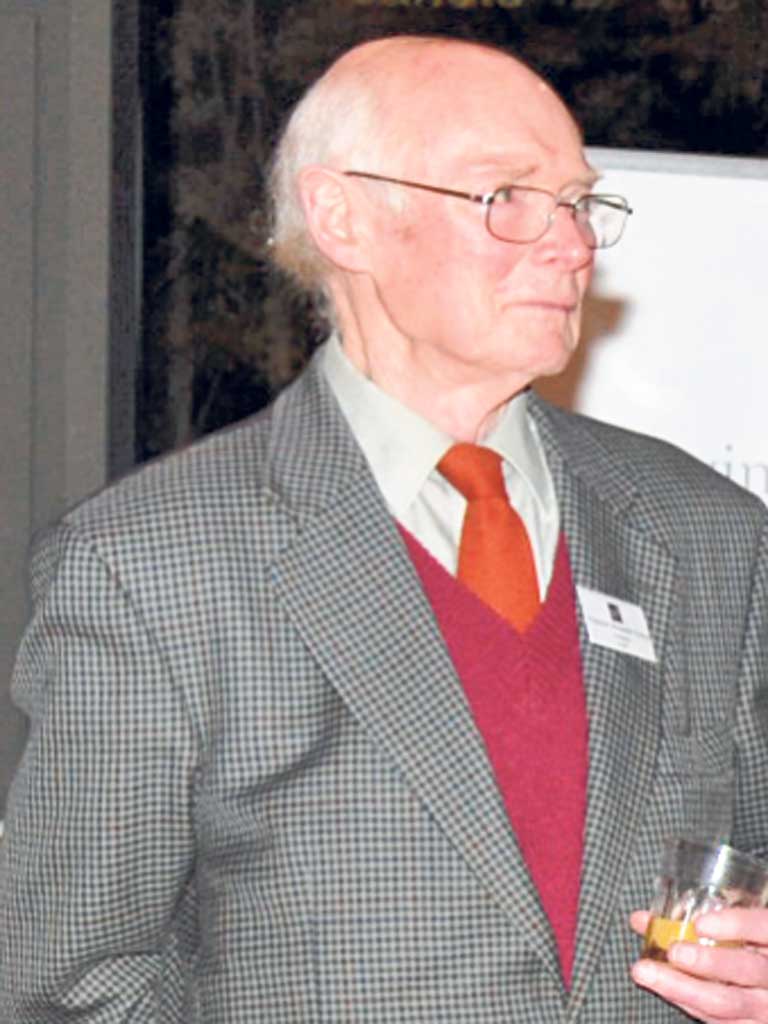Professor Sandy Fenton: Scholar of Scottish antiquities

Sandy Fenton was among the very greatest scholars of the Ethnology and Antiquities of Scotland of this age – or of any age. For 15 years he was a member of the Ancient Monuments Board for Scotland, from 1979 to 1994.
My wife was one of the Board members, and they had the civilised habit of allowing paying spouses to come on their annual expeditions to those parts of Scotland well endowed with antiquities. Thus I saw at first hand Sandy Fenton's charming erudition, which was a marvel of serious scholarship to us all. Indelibly etched on my memory is Fenton's explanation of life at the Black House at 42 Arnol in the north end of the Island of Lewis. His written description, first published in 1978 and reissued in 1989, is the greatest record of a way of life that once dominated so much of the Highlands and Islands.
Sandy Fenton was born in 1929 at Shotts, then a mining town at the heart of the productive North Lanarkshire coalfield. Among family and friends were the Herbisons; Margaret Herbison was later to be the miners' MP, Chairman of the Labour Party (UK) and Harold Wilson's first Minister of Pensions. His father, also Alexander Fenton, and his wife Annie Stronach moved north to Turrif, where Sandy Fenton attended the academy and progressed to Aberdeen University.
Aberdeen had the tradition of sending its most talented graduates for further study in Cambridge and Fenton entered and completed the archaeological and anthropological tripos with an optional subject of Norse and medieval language. For archaeology he sat at the feet of Glyn Daniel, who educated us all on television, and at the feet of Meyer Fortes, the great anthropologist and expert on indigenous peoples.
Fenton was grateful for the inspiration of Cambridge before going on to complete a DLit in Edinburgh, which led to his becoming a Senior Assistant Editor of the Scottish National Dictionary between 1955 and 1959 combined with part-time lecturing in English as a foreign language. He became Assistant Keeper of the National Museum of Antiquities in Scotland, progressing to Deputy Keeper and Director. He combined this with being part-time lecturing in the Department of Scottish History at Edinburgh University.
As Rector of the University from 2003 to 2006 I know that the now flourishing Department of Scottish Studies regarded Fenton as one of their founders. Later he was to occupy the Chair of Scottish Ethnology and Director of the School of Scottish Studies.
However, Fenton was no insular, narrow scholar. He was a foreign member of the Royal Gustav Adolf Academy at Uppsala, Sweden, appointed in 1978, and of the Royal Danish Academy of Sciences and Letters in 1979. He was given the honour of becoming an honorary member of the Volkskundliche Kommision Fur Westfalen in 1980. In 1983 he was made a member of the Hungarian Ethnographical Society and became a jury member in 1975 – and subsequently for 20 years of the Europa Prize for Folk Art.
He was also President of the Permanent International Committee of the International Secretariat for Research on the History of Agricultural Implements. Hearing Fenton on site on some windswept landscape describing the use of a particular agricultural instrument in ancient and medieval times was a revelation. He was also Honorary President of the Scottish Vernacular Buildings Working Group and of the Scottish Country Life Museums Trust. Many modest if interesting buildings owe their survival to Fenton's work.
Fenton's writing is characterised by the greatest detail teased out of ancient records. In the 1970s he illuminated the place names of Shetland and his book Scottish Country Life (1976, republished in 1999) won the Scottish Arts Council Book Award. His The Northern Isles, Orkney and Shetland, (1978, republished in 1997) won him the Dag Stromback Award. In 1985 he published an essay under the title "If All The World Were a Blackbird", which he translated from the Hungarian. Almost as difficult as Hungarian is the language and dialect of Buchan, but Fenton's 1995 work Craiters – or Twenty Buchan Tales, and Buchan Words and Ways in 2005, really saved a subculture which but for Fenton would have vanished.
Professor Alexander Fenton, ethnologist and scholar of Scottish Studies; born Shotts, Lanarkshire 26 June 1929; Assistant Keeper of the National Museum of Antiquities of Scotland 1959-75, Deputy Keeper 1975-78, Director 1978-85; Member of the Ancient Monuments Board for Scotland 1979-94; CBE 1986; married 1956 Evelyn Hunter (two daughters); died Edinburgh 9 May 2012.
Subscribe to Independent Premium to bookmark this article
Want to bookmark your favourite articles and stories to read or reference later? Start your Independent Premium subscription today.

Join our commenting forum
Join thought-provoking conversations, follow other Independent readers and see their replies